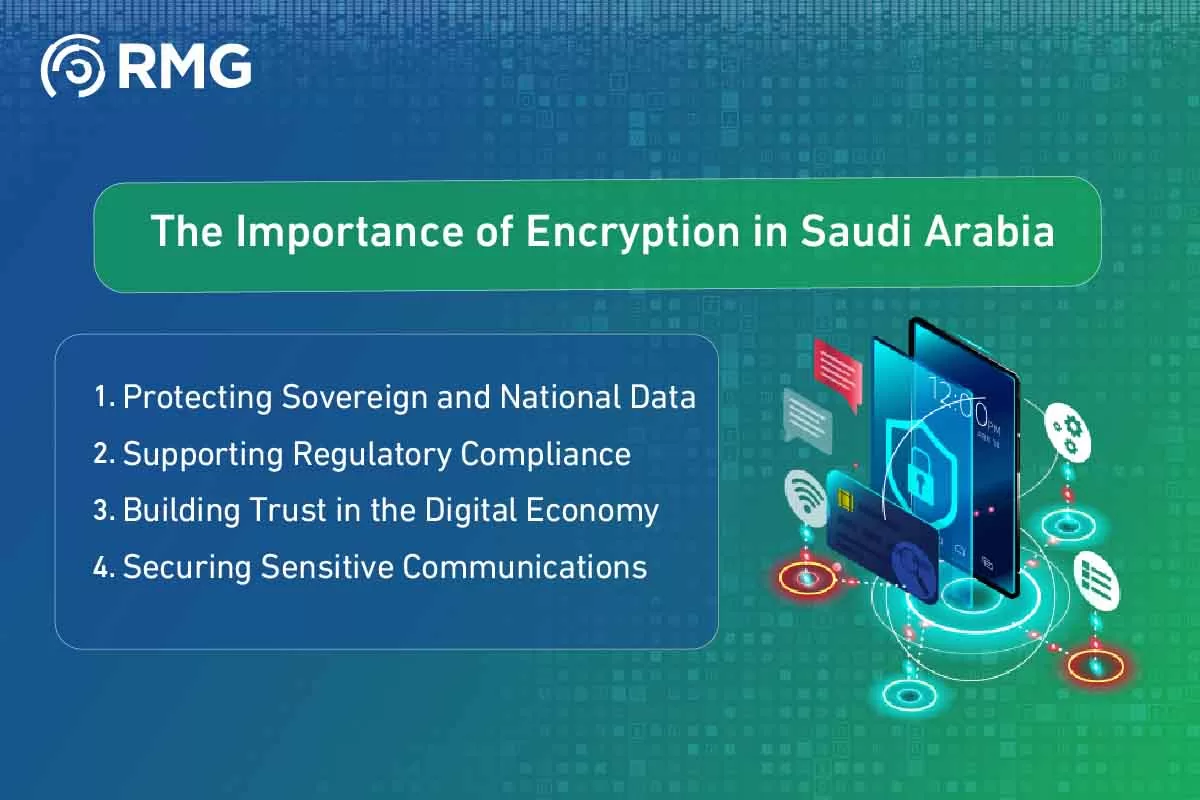Blog Body
At the heart of the Kingdom’s digital transformation, how does encryption become the cornerstone of your security? Explore the legislative and technical dimensions of protecting your most valuable digital assets and learn about leading solutions to ensure compliance and digital sovereignty.
In the midst of Saudi Arabia’s astonishing digital economic acceleration and the increasing reliance on data as a vital strategic asset, the discussion of cybersecurity is no longer a luxury—it’s an absolute necessity. At the core of this security system, encryption in Saudi Arabia stands out as the first line of defense and the fortified shield that protects sensitive information for both government entities and private companies. The ability to transform valuable data into unintelligible symbols, accessible only to authorized individuals, is the essence of digital trust upon which modern transactions are built and national assets are safeguarded.

The Importance of Encryption in Saudi Arabia: A Strategic Imperative in the Age of Digital Transformation
Encryption in Saudi Arabia is no longer just a technical tool; it is a strategic pillar supporting national transformation goals. With the launch of mega-projects and the expansion of e-government services, the volume of data being exchanged is growing exponentially, which necessitates a secure and reliable digital infrastructure. The importance of encryption is evident across several key areas within the Kingdom:
- Protecting Sovereign and National Data: Government data, citizen information, and data related to critical infrastructure are considered national assets. Strong encryption provides a fundamental guarantee against espionage and hacking attempts, protecting these assets from falling into the wrong hands and thereby enhancing the Kingdom’s digital sovereignty.
- Supporting Regulatory Compliance: With strict regulations such as the Personal Data Protection Law (PDPL) and the Essential Cybersecurity Controls (ECC) issued by the National Cybersecurity Authority (NCA), implementing encryption solutions has become a legal requirement, not an option. Encryption helps organizations comply with these regulations and avoid financial and reputational penalties.
- Building Trust in the Digital Economy: From e-commerce to digital banking and the healthcare sector, consumers and business partners rely on their financial and personal data being secure. Encryption in Saudi Arabia is a critical factor in building this trust, encouraging the adoption of modern technologies, and driving economic growth.
- Securing Sensitive Communications: Government entities, military organizations, and major corporations depend on secure communication channels to exchange strategic information. Encryption ensures the confidentiality and integrity of these communications, whether they are emails, voice calls, or data transmitted over networks.
The Regulatory and Legislative Framework: Understanding Encryption Laws in Saudi Arabia
Saudi Arabia is leading pioneering regulatory efforts to establish clear and binding standards for the use of encryption, with the goal of creating a secure and unified digital environment. The National Cybersecurity Authority (NCA) is the central body in this field, having issued a set of policies and controls that define the landscape of encryption use in Saudi Arabia.
Among the most prominent of these regulations are the “Essential Cybersecurity Controls (ECC),” which mandate that all government and private entities that own or operate sensitive infrastructures must implement specific levels of encryption to protect data at rest and in transit. The “Personal Data Protection Law” also emphasizes the need to take technical and organizational measures to protect data, and encryption is considered one of the most important of these measures. These laws not only enforce the use of encryption but often specify the approved types of algorithms and the required strength levels, ensuring that global best practices are applied in accordance with national requirements.
Government Entities and Their Role in Enhancing the Kingdom’s Encryption Ecosystem
Government entities play a dual role in the encryption ecosystem in Saudi Arabia; on one hand, they set the regulatory frameworks, and on the other, they are among the largest implementers of these technologies.
- National Cybersecurity Authority (NCA): The NCA works to develop and enforce policies and standards related to encryption and evaluates the commitment of various entities. It also provides guidance and technical support to raise the national level of cybersecurity maturity.
- National Center for Digital Certification (NCDC): Affiliated with the Ministry of Communications and Information Technology, the NCDC is responsible for managing the Public Key Infrastructure (PKI) in the Kingdom. The center provides digital certification that is the foundation for many encryption applications, such as electronic signatures and website security, contributing to building trust in digital transactions.
This active government role ensures that encryption solutions in Saudi Arabia are compliant with international standards and are designed to meet the Kingdom’s unique security needs.
Encryption Applications in the Saudi Private Sector: Protecting Assets and Fostering Trust
In the private sector, encryption is no longer just a security measure; it has become a real competitive advantage. Organizations that invest in strong encryption solutions gain the trust of their customers and ensure business continuity. The applications of encryption in this vital sector are numerous:
- Financial and Banking Sector: Subject to strict oversight from the Saudi Central Bank (SAMA), this sector requires the encryption of all customer data and financial transactions to protect them from fraud and breaches.
- Healthcare Sector: With the transition to electronic health records, encrypting patient data has become essential to protect their privacy and comply with health regulations.
- Retail and E-commerce Sector: Encrypting payment data and customer details is critical to securing online purchases and preventing identity theft.
- Energy and Industrial Sector: Protecting operational and industrial control data (OT) through encryption prevents cyberattacks that could disrupt production or cause environmental disasters.
The adoption of encryption in Saudi Arabia by the private sector not only protects data but also builds a strong reputation for the organization as a reliable entity that cares about the security and privacy of its customers.
Key Encryption Technologies and Standards Adopted in Saudi Arabia
The Kingdom relies on a set of trusted international standards and algorithms to ensure the highest levels of security. These technologies include:
- Symmetric Encryption: Such as the AES (Advanced Encryption Standard) algorithm, which is considered the gold standard for encrypting data at rest. The NCA recommends using 256-bit keys to ensure maximum protection.
- Asymmetric Encryption: Such as RSA and ECC (Elliptic Curve Cryptography) algorithms, which are used to secure data in transit via protocols like TLS/SSL, and in digital signature systems and public key infrastructure.
- Hashing: Algorithms like SHA-256 are used to verify data integrity and ensure it has not been tampered with, and they are an integral part of many security protocols.
Choosing the right technology depends on the use case and the nature of the data, and it is a strategic decision that requires deep technical expertise and a precise understanding of regulatory requirements.
Renad Al-Majd: Your Strategic Partner for a Secure, Encrypted Infrastructure
In the midst of this complex technical and regulatory landscape, the role of an expert partner capable of translating requirements into practical and effective solutions becomes prominent. This is where Renad Al-Majd (RMG) comes in, having established itself as a leading force in providing encryption consultations and solutions in Saudi Arabia. Renad Al-Majd’s services are not limited to providing a product; they extend to offering a strategic partnership aimed at building a comprehensive security system.
Renad Al-Majd deeply understands the challenges facing government and private organizations, from the complexities of complying with NCA regulations and the Personal Data Protection Law to the need for customized encryption solutions that fit existing infrastructure. The company’s team of experts possesses precise knowledge of approved algorithms and global and local best practices, enabling them to design and implement encryption strategies that protect your most valuable digital assets and ensure your business continuity with confidence and security.
An Invitation to Leadership: Join the Elite of Secure Organizations with Renad Al-Majd
Protecting your organization’s data today is an investment in its future. Cybersecurity is no longer solely the responsibility of the IT department; it is a strategic decision made by leaders who understand that trust is the most important currency in the digital age.
We invite government entities and leading organizations in the public and private sectors to take a proactive step toward fortifying your digital future. Renad Al-Majd invites you to begin a strategic dialogue about how to build and implement encryption solutions in Saudi Arabia that align with your goals and aspirations. Whether you are seeking to achieve full compliance, protect your sensitive data, or secure your communication channels, Renad Al-Majd is your ideal partner for achieving leadership in the field of digital security. Contact us today, and together, let’s begin the journey of securing your assets and enhancing your position at the forefront of the Saudi digital landscape.





















